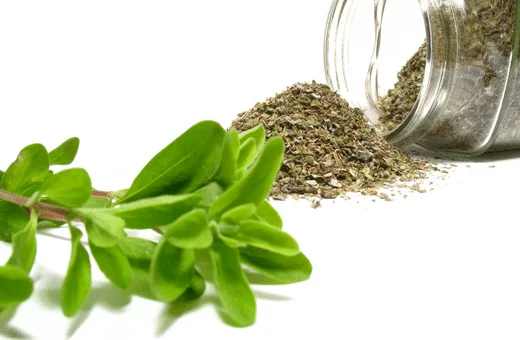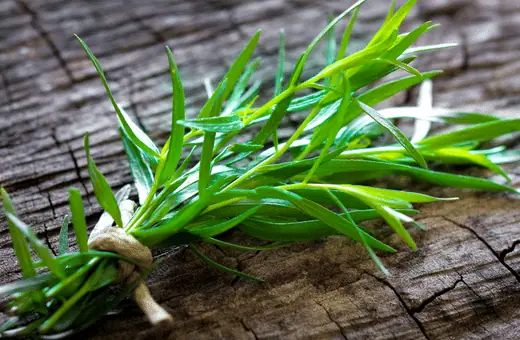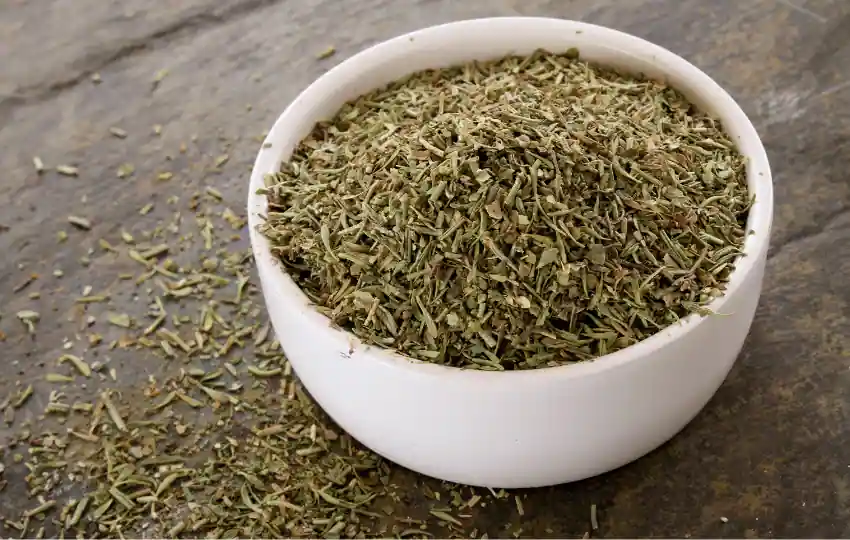Cooking with herbs can be a tricky business. If you don’t have the right fresh herbs, you may feel compelled to reach for dried thyme.
But what if you don’t have any dried thyme on hand?
Don’t worry – there are plenty of great dried thyme substitutes that will deliver all the flavor and aroma you’re looking for in your dish.
Let’s take a glance at some of my favorite options when it comes to substituting dried thyme.
What is Dried Thyme? What does dried thyme taste like?
Dried thyme is a commonly used herb in many different cuisines across the world. It is an evergreen shrub born in the Mediterranean region and is a powerful source of flavor and aroma in dishes like stews and soups.
Despite its tiny leaves, dried thyme has an intense flavor with notes of lemon, mint, and a hint of clove.
Its taste often elevates the flavors of many dishes it’s used in, lending complexity and sophistication to even the simplest recipes.
All in all, dried thyme is a versatile, flavorful, and fragrant herb that brightens any dish!
Uses of dried thyme in cooking
Dried thyme is an essential ingredient in many flavorful dishes. Its versatility is unmatched as it adds warm complexity to meat-based dishes and vegetarian salads alike.
Its savory, subtle scent adds a new level of flavor that can be used for delicate sauces to robust stews.
Its origins date back to ancient Greece, and it has always had a place of honor among many great chefs over time.
Dried thyme offers an easy way to get the most out of each dish you prepare, including seasoning poultry and fish with ease, adding depth to soups, or being sprinkled over focaccia bread or baked sweet potatoes.
For those who desire light yet flavorful cooking, dried thyme is an aromatically delightful option that never disappoints!
Best Substitutes for Dried Thyme
1. Marjoram
Marjoram is a constituent of the mint family and has similar flavors as thyme, with a hint of citrus and licorice notes.
It’s slightly sweeter than thyme and works well as a substitute because it has a milder flavor that won’t overpower other ingredients in your dish.
It also pairs nicely with oregano, which is often used together with thyme in many recipes.

Marjoram is available in both fresh and dried forms, but if you’re going to use it as a substitute for dried thyme, we recommend using the fresh version.
The flavor will be much more intense, so use about half of what the recipe calls for when substituting marjoram for dried thyme.
2. Oregano
Oregano is another mint family member with an earthy flavor with hints of sweetness and bitterness.
It has a stronger flavor than marjoram but still goes well with many dishes that call for thyme.
Oregano also pairs nicely with basil, which is often used in combination with thyme when cooking Italian or Mediterranean dishes.
It works especially well when added to sauces and soups but is used in other recipes too.
However, since oregano is more pungent than thyme, make sure you use less of it when substituting so that your dish doesn’t become overly flavored with oregano.
As with marjoram, oregano is available both fresh and dried, but we recommend using fresh oregano as a substitute for dried thyme since it will give your dish more intense flavors without overpowering other ingredients.
Use about half as much oregano as the recipe calls for when substituting it for dried thyme.
3. Savory
Savory is an herb from the mint family that has an earthy, peppery flavor similar to that of sage and rosemary but slightly less intense than either one alone.
It works well as a replacement because it adds complexity to dishes without overpowering them like some other herbs can do.
Like oregano and marjoram, savory is available both fresh and dried, but we recommend using fresh savory as a substitute for dried because its flavor will be much more intense than its dry counterpart.
Use about half as much savory when substituting it for dried thyme in recipes.
4. Basil
Basil has a sweet, herbal flavor that makes it a great substitute for dried thyme in many recipes.
It pairs especially well with tomato-based dishes like pasta sauces and pizza but can also be used to add flavor to other dishes as well.
Just remember that basil has a much more intense flavor than thyme, so use only half as much as you would if using dried thyme instead.
5. Sage
Sage has a woodsy flavor with hints of lemon and pepper, which makes it the perfect substitution for dried thyme in savory dishes such as stuffing or roasted vegetables.
As with other herbs, use only half as much sage as you would normally use when substituting for dried thyme since sage tends to have a stronger taste than other herbs like oregano or basil.
6. Rosemary
Rosemary is another herb with an intense flavor profile, so make sure you don’t overdo it when adding it to your dish instead of using dried thyme.
It pairs particularly well with potatoes and roasted vegetables but can also be used in sauces and soups too.
7. Parsley
Parsley is often overlooked as an herb with culinary uses thanks to its ubiquity in decorations on restaurant plates — but parsley can do way more than just look pretty!
In particular, its lemony notes make it an excellent substitute for dried thyme when added to sauces or dressings.
Just make sure not to add too much since parsley does have quite an assertive taste compared to some other herbs like basil or oregano.
8. Tarragon
Last but not least is tarragon—a classic French herb with an unmistakable licorice-like taste profile which makes it the perfect substitution for cooked meats like pork or beef!
Plus, its mildness means that you won’t have to worry about overpowering your meal if you add too much!

Tarragon also pairs wonderfully with fish recipes making it an ideal choice when looking to create something truly special out of ordinary ingredients!
Try using tarragon instead of dried thyme next time you’re cooking up something savory – just don’t forget that a little bit goes a long way!
How do you make dried thyme at home?
Making your own dried thyme at home is a great method to save money and ensure you have a plentiful supply of herbs.
To begin, carefully prune off thyme sprigs from the main stalks. Give each sprig a good wash and leave aside to drain and dry out for around 12 hours.
Once the thyme sprigs appear slightly wilted and are no longer damp, spread the individual leaves across a baking tray.
Put in an oven preheated to its lowest setting (on fan bake) for 1-2 hours, occasionally stirring until crisp.
Finally, allow the dried thyme to cool down before storing it away in airtight containers. Now you have homegrown, organic dried thyme ready to flavor your dishes!
Read more: Best Italian seasoning substitutes
Conclusion on dried thyme substitute
Whether you’re looking to recreate classic Mediterranean flavors or simply trying something new in the kitchen, these 8 herbs are excellent substitutes for dried thyme!
No matter which one you choose, each one will bring its own unique flavor profile that will carry your dishes from ordinary to extraordinary in no time at all!
With these options handy next time you’re cooking without dry thyme on hand, there’s no need to worry about missing out on any delicious flavors, thanks to these tasty alternatives!
So go ahead – experiment away – we guarantee you won’t regret it!
FAQs on dried thyme substitute
Q1. Are thyme and oregano the same?
The answer is often confusing, but in fact, these two herbs are quite different! Thyme has a savory, robust aroma and can be used as a versatile flavoring for savory dishes such as stews, soups, and casseroles.
On the other hand, oregano is more pungent and spicy, giving it a unique flavor that longtime fans of Mediterranean cuisine are sure to love.
Knowing the difference between thyme and oregano can make all the difference in the flavor profile of your favorite dishes! So don’t forget which herb you’re reaching for next time – both thyme and oregano deserve their place in your pantry!
Q2. Can I substitute rosemary for thyme?
While rosemary and thyme are both popular herbs used to flavor many dishes, they are not always interchangeable. Both possess a distinct flavor that can stand alone in a dish, though they differ in both taste and intensity.
Rosemary has a more robust flavor and pairs especially well with beef, lamb, pork, or game meats. Thyme has a much milder taste that works better for poultry and fish dishes.
Many substitute rosemary for thyme of necessity when it is not available, but to get the best flavors from any dish, it is best to use the herb called for by the recipe.
Q3. Does dried thyme taste the same as fresh?
The age-old debate over dried vs. fresh herbs has been raging for centuries. Many home cooks swear by the bright, intense flavor of fresh thyme, while others echo the campy refrain that when it comes to taste, dried thyme is where it’s at. So which is it?
Does dried thyme taste the same as fresh? The answer lies in understanding what happens to an herb (or spice) when it dries. When put in a dehydrator or an oven, herbs undergo chemical changes that can make the flavor profile inherently different from its fresher counterpart.
Dried thyme doesn’t overpower the senses like fresh – but its delicately smoky and woodsy flavor does bring something special to the dinner table.
Q4. What is the equivalent of 1 tsp fresh thyme to dried?
Using fresh thyme in a recipe can really enhance the flavor of dishes, but it’s not always available. Fortunately, dried thyme offers the same herby, earthy aroma and taste that we enjoy from fresh thyme.
The equivalent substitution for 1 teaspoon of fresh thyme is only 1/4 teaspoon of dried thyme – much less! So if you’re ever in a pinch without any fresh herbs in your pantry, use dried thyme as a suitable replacement for great results.

